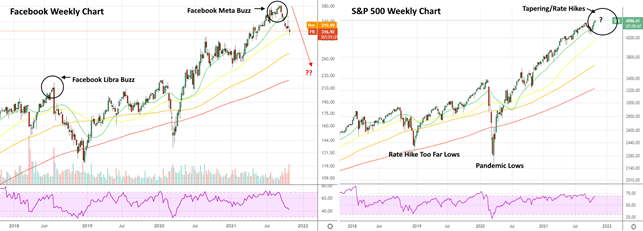Facebook’s recent rebranding of its parent company to 'Meta' is interesting on a number of levels. The change is being discussed in a similar vein to Google’s move in 2015 to rename its parent company 'Alphabet'. Alphabet allowed Google to venture into more markets than search, just as the Facebook/Meta rebranding allows Facebook to explore areas such as virtual reality, augmented reality, and the idea of the public virtual spaces.
Facebook has actually been teasing this change of direction since earlier this year when it started calling itself a “metaverse” company and attempting to generate a buzz around shared virtual worlds for much more than just gaming. The recent publicity video featuring Mark Zuckerberg himself attempts to generate further buzz around the idea.
History Doesn’t Repeat, It Rhymes
Why is this of interest to traders? Well, aside from its implications on the stock’s price, there’s a broader story here that’s worth knowing about. This isn’t the first time in recent history that Facebook has made a very public attempt to pivot. The last time it made such an effort was in the summer of 2018. This is when it announced Libra, the company’s own digital currency to be used across its app ecosystem.
If you cast your mind back, Facebook was caught up in a storm of negative publicity, just as it is today. In 2018, it was all about data protection and revelations about how the platform was abused in order to influence election results. This time it’s about the Facebook Papers, a leaked set of documents suggesting that the company has known much more about the deleterious effects of its platforms on users than it has let on. Both instances have taken place against a backdrop of uncertainty as to how such tech monopolies should be regulated, and a general sense that they are getting too big and influential to be left to their own devices.
The initial reaction to Facebook announcing the Libra currency echoed the broader concerns about its size and influence. A company with a user base of billions and its own currency suddenly starts to resemble a sovereign nation rather than a corporate entity, and this was not lost on regulators, policymakers, and central bankers at the time.
The Markets Then and Now
What’s even more interesting are the parallels in timing and market regime of both of these moves by Facebook. As you can see in the weekly Facebook stock chart below, both come at, or around, all-time highs for the company’s stock. They also take place in a bull market that seems severely overstretched. In 2018, Facebook’s announcement preceded the worst correction in a decade as US markets reacted to Jerome Powell’s final (and some would say fatal) rate hike. Today, US markets are trading 60 or so per cent higher than they were in 2018, at a time of almost total global uncertainty, with one central bank after another turning hawkish and the same J. Powell at the helm attempting to tighten once again.
So, we have a company ostensibly trying to shake off a bad reputation by venturing into other areas of potential growth (in 2018 it was cryptocurrencies, in 2021 it’s metaverses), at the tail end of an extended bull market, in an environment of increasing hawkishness from central banks. The last 2018 hike was actually the 9th since 2015. How many will it take in 2022 for the market to throw a tantrum? So far in 2021, markets still seem to be playing chicken with the Fed’s talk of tapering asset purchases and raising rates at least twice next year.
Back to Facebook
What about the stock itself? What does all this say about its future prospects? It’s difficult to say anything with any authority in a stock market so divorced from fundamentals. A perfect example of this is Meta Materials (ticker: MMAT) a completely unrelated company that rallied 18% on the Facebook news purely by virtue of its having a similar name.
What we can say with some certainty is that with both attempted pivots the company appears to be stepping into territory quite foreign to it; in areas where a great deal of innovation is already taking place natively. How likely is Facebook to be able to innovate in either domain? Perhaps Facebook assumes that its size and network effect will allow it to compete in any vertical. This may well be the case. On the other hand, it may prove to be an erroneous assumption, particularly when the very issues that have tarnished its reputation thus far are even more relevant to 1. the money people use, and 2. the parts of themselves they choose to keep private when frequenting the virtual worlds of the future.
HYCM is an established and multi-regulated global broker that provides a first-class trading experience and offers a wide range of 300+ instruments, including stock CFDs like Facebook.

